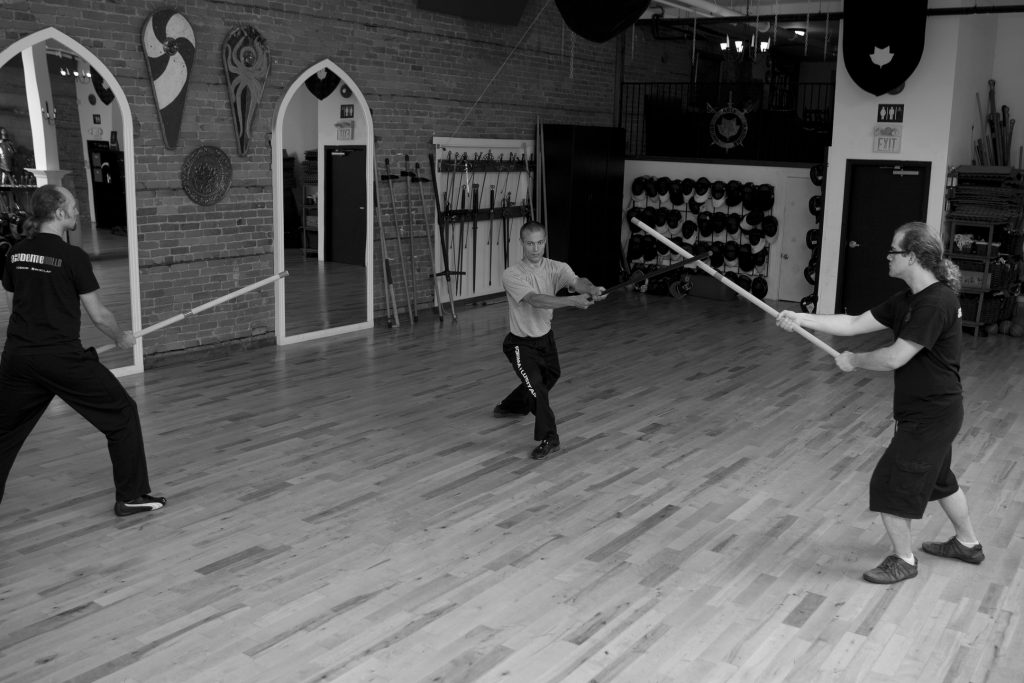This is a special guest blog post from the internationally acclaimed, award-winning martial artist and author Luis Preto, who will be talking about his upcoming week-long intensive workshop on Jogo do Pau.
http://vimeo.com/107810727
Greetings everyone!
Regarding the upcoming course at Academie Duello, I’d like to start by stating that I am very excited about this project. Not only will this give me an opportunity to revisit Vancouver, UBC, and the good friends I made there, but the course itself has been an old dream of mine.
Though most people have come to see me as a Jogo do Pau instructor, I am actually a Phys Ed teacher and sports coach who happens to also teach Jogo do Pau. Ultimately, this means that my main interests reside in looking to refine teaching methodologies together with the effective development of martial skills, and not so much with the promotion of one specific art as “The art” ... which is what this course is mostly about: running a course on fundamental martial skills and teaching practices.
Surely enough, everyone has their own dominant sources for information and, in my case, Jogo do Pau has been one of my main sources. However, while martially speaking, I have been exposed to other influences, in terms of teaching approach, I rely heavily on practices found in sport sciences instead of those found in traditional martial arts. My complementary martial sources have enabled me to add to Jogo do Pau’s motor patterns a better understanding of space and timing management, as well as improved body flow by means of postural and breathing guidelines.
As for the teaching practices I am promoting, they are mainly distinguished by the fact that I have been implementing the ecological perspective of human movement which, in short, has trainees being task and tactically oriented, instead of being movement oriented. This to say, instead of teaching trainees movements by focusing their internally on their own body awareness and control, I look to have them focused on reading the environment they are exposed to, so as to intuitively develop the appropriate problem solving solutions.
For those interested in a bit of history and, eventually, applying for the assistant instructor certification, what is Jogo do Pau?
Jogo do Pau is known by most to be a stick fencing art out of Portugal. Being knowledgeable in Jogo do Pau and having been around several WMA / HEMA practitioners over the past years, I have come to realize many differences between the two. Though it is, undoubtedly, a stick combat art, on a personal level I have come to disagree with this narrow definition, since:
1. The French Jeux du Baton (preserved until the 1980’s) shared Jogo do Pau’s name, weapon of use and technique ... which brings about the strong chance of this system being in fact a European combat system that simply ended up being preserved in Portugal. And, since the evolution of other combat skills, such as jousting, did occur as a result of people from different countries interacting with each other, it is only natural that the same occurred in fencing arts as well.
2. The similarities in both terminology and outnumbered combat tactics between Jogo do Pau and some of Portuguese sword fencing's written records open the door to Jogo do Pau possibly being a living art that can share valuable input in the interpretation of historical fencing’s treatises.
Though it will be forever impossible to know for sure how close the development of stick and sword fencing systems took place, I believe that the most relevant thing for today’s practitioners is that this living tradition:
• Preserved the practice of both outnumbered combat and duelling,
• Offers both double and single handed weapon practice,
• Has insight to offer pertaining the tactical use of fencing’s fundamental elements (waiting guards, footwork, defensive maneuvers, etc.)
• Last, though not least, Jogo do Pau’s experience with putting together a competitive setting (which dates back to the early eighties), can also supply useful input and guidance regarding the issues of gear selection and rule set composition; which are topics to be approached during the course.
Schedule
Monday Nov. 10th - Friday Nov.14th
10am to 12pm - Block 1
12pm to 1pm - Lunch
1pm to 4pm - Block 2
25 hours of instruction through the week.
Cost: $425 (includes staff)
OPTIONS:
Jogo do Pau Instructor Level 1 Certification Add On (+$50)
JdP level 1 - Assistant Instructor certification will be available through this course. Students will have an additional 30 minutes of theoretical work to do each day as well as an examination at the end of the week.
Complete Immersion Add On (+$50)
If 5 hours per day of instruction is not enough for you, join as much as an additional 5-hours per day of instruction in Western Martial Arts from world renowned instructors in Italian Longsword, Rapier, and Sword and Buckler from 5pm to 10pm each day during the intensive.Fundamentals programs run each day. More advanced programs will require approval of Academie Duello staff based on your prior experience.
You can register online, visit our downtown location at 412 West Hastings, or call us at 604-568-9907

